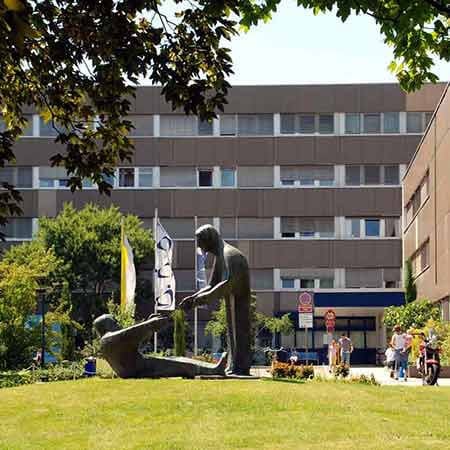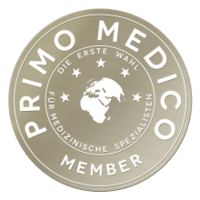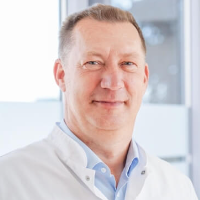Chemotherapy for Testicular Embryonal Carcinoma treatment
Treatment prices are regulated by national law of the corresponding countries, but can also include additional hospital coefficients. In order to receive the individual cost calculation, please send us the request and medical records.

Department of Hematology and Oncology
The Department of Hematology and Oncology treats solid malignant tumors of various localizations, blood cancer, and benign hematopoietic pathologies. A qualified team consisting of oncologists, hematologists, psycho-oncologists, physiotherapists, and experienced nursing staff takes care of the health of patients. Whenever required, doctors from related medical fields are also involved in the therapeutic process. All specialists make every effort to provide patients with effective and personalized medical services while surrounding them with care. The department is part of the Cancer Center of the hospital, which is certified according to the requirements of the German Cancer Society (DKG). The department prefers a multidisciplinary approach, holding weekly tumor boards with the participation of oncologists, hematologists, radiation therapists, and surgeons, as well as highly specialized experts in gynecology, urology, gastroenterology, pulmonology, etc. The department's specialists have in their arsenal modern treatment methods for malignant diseases, including chemotherapy, targeted therapy, immunotherapy, hormone therapy, and many others. Patients with advanced stages of cancer are offered palliative care aimed at alleviating pain syndrome and ensuring a decent quality of life.




Department of Oncology and Palliative Care
The Department of Oncology and Palliative Care provides palliative treatment for patients with incurable diseases. The goal of the department's physicians is to alleviate the symptoms of the disease and improve the quality of life. The department's specialists take an individual approach to each patient, always respecting the patient's wishes. A competent multidisciplinary team, consisting of palliative care specialists, nurses, psycho-oncologists, physiotherapists and social workers, works here for the benefit of the patients.





Department of Oncology and Surgical Oncology
The Department of Oncology and Surgical Oncology specializes in the conservative and surgical treatment of the full range of cancers. The department is one of the leading in the field of its competence in the international medical arena and treats patients with especially complex clinical cases. The priority focuses of the department's medical team include regional chemotherapy, hyperthermia, immunotherapy, surgical oncology and pain therapy. The goal of the department's doctors is to achieve an optimal therapeutic result with minimal damage to the healthy tissues.

Testicular embryonal carcinoma is the most malignant tumor of this organ, which grows rapidly and metastasizes early. Most patients with this disease receive chemotherapy, usually after the surgical removal of the tumor and lymph nodes. Doctors abroad conduct chemotherapy according to international protocols and with the use of the very latest drugs. Doctors prescribe high-quality accompanying treatment to minimize the risk of complications and reduce the number of side effects. You are welcome to use the Booking Health service to find the cost of treatment and choose a medical care program at the best price.
Content
- How often is chemotherapy given for embryonal carcinoma?
- How is chemotherapy used for testicular cancer?
- Side effects
- Chemotherapy after surgery
- Chemotherapy for advanced stages
- Where to undergo treatment?
How often is chemotherapy given for embryonal carcinoma?
Embryonal carcinoma is the most aggressive type of testicular cancer. Chemotherapy for this cancer is therefore almost always used, even at the early stages.
The choice of treatment regimen is influenced by the percentage of embryonal carcinoma in the cancer. Pure embryonal carcinomas are rare, as they account for no more than 3% of all germ cell neoplasms. Approximately 40% of these tumors, however, contain some proportion of embryonal carcinoma. These neoplasms are mixed, and therefore cancer cells of different types are simultaneously found in them. The higher the proportion of embryonal carcinoma, the worse the long-term prognosis.
The neoplasms in which the proportion of embryonal carcinoma exceeds 50% are considered aggressive. These patients almost always require chemotherapy. Nonetheless, if the proportion of embryonal carcinoma is small, the disease can be cured with a single surgical procedure at its early stage.
How is chemotherapy used for testicular cancer?
Most patients with embryonal carcinomas receive drug therapy.
Systemic chemotherapy for cancer involves the administration of drugs intravenously, less often orally. The technique targets all cancer cells in the body, wherever they are: in the testicles, regional lymph nodes, distant organs, and tissues.
Chemotherapy is carried out in cycles. Each cycle of chemotherapy for testicular cancer is followed by a rest period. Chemotherapy cycles last from 3 to 4 weeks. In total, embryonal carcinomas require 2 to 4 cycles, depending on which regimen is used, at what stage the neoplasm is detected, and what other treatment methods are planned or used in the fight against cancer.
At least two drugs are usually used at the same time. As a rule, these are the three drugs. It is important that a person be in good health. In this case, they will be able to endure cancer treatment without any severe complications. Given that most men with embryonal carcinoma are young, doctors usually manage to use optimal chemotherapy for cancer.
The most commonly used chemotherapy regimens for testicular carcinomas are:
- BEP;
- EP;
- VIP.
These are first-line treatment options. However, if the initial regimen does not work or the tumor recurs, doctors may propose another regimen, including a more intensive one, with the use of more drugs at the same time.
Side effects
Chemotherapy for cancer suppresses not only malignant cells but also ordinary ones. This treatment has the greatest effect on those cells and tissues that divide rapidly.
Therefore, chemotherapy for cancer always causes side effects. The main ones are as follows:
- hair loss;
- mouth ulcers;
- diarrhea;
- nausea;
- vomit;
- loss of appetite;
- severe weakness.
Some drugs can damage the kidneys, nerves, hearing, lungs, or bladder. When using them, swelling, tingling in the legs and arms, an abnormal feeling of cold or heat, hearing loss, shortness of breath, and blood in the urine may develop.
Most side effects are temporary. They completely disappear after the completion of chemotherapy for cancer. At oncological clinics abroad, patients receive accompanying treatment that helps support the body and relieve symptoms.
All chemotherapy drugs, without exception, depress the bone marrow. They interfere with the production of red blood cells, white blood cells, and platelets. Patients, therefore, may suffer from blood clotting disorders, anemia, and weak immunity.
Chemotherapy after surgery
In most cases, the very first treatment for patients with testicular cancer is surgery. It helps to cure embryonal carcinoma completely. Most patients however also require chemotherapy to reduce the risk of a recurrence.
When performing the surgical intervention, doctors remove:
- a testicle with the spermatic cord;
- retroperitoneal lymph nodes.
It may be one or two different operations. It depends on the results of a retroperitoneal lymph node dissection, and whether it was performed at all, whether chemotherapy will be used, in what regimen, and how many cycles are required.
A retroperitoneal lymphadenectomy is performed not only for treatment, but also for diagnostics. Doctors can know for sure whether there are cancer cells in the lymph nodes or not. This cannot be determined with non-invasive methods since even non-enlarged lymph nodes can be affected by cancer metastases.
A retroperitoneal lymphadenectomy is, however, a traumatic operation, which often causes complications. Therefore, in the case of a small tumor size, if doctors believe that the tumor can be limited only to the testicle, this operation is sometimes not performed.
If a retroperitoneal lymphadenectomy is not performed, doctors cannot know for sure whether there are metastases in the lymph nodes or not. Nonetheless, metastases can be suggested on the basis of laboratory diagnostics, which involves determining tumor marker levels. In the case of embryonal carcinoma, all three tumor markers of testicular cancer are elevated: alpha-fetoprotein (AFP), human chorionic gonadotropin (hCG), and lactate dehydrogenase (LDH). The first two markers have the highest specificity. If their levels are normalized, with a high probability, there are no metastases.
Treatment options for patients after testicular removal without a lymphadenectomy include:
- medical supervision;
- chemotherapy.
Medical supervision is only possible if the tumor has not penetrated into the blood vessels. Then, after the removal of the testicle, a patient is examined by a doctor once every 2 months in the first year, once every 3 months in the second year, and then annually. Every time a man has a tumor marker test. Computed tomography for the diagnostics of possible lymph node metastases is performed once every 4 months in the first year, once every 6 months in the second year, and then annually for 5 years.
Chemotherapy may be required in the following cases:
- lymph node enlargement;
- elevated tumor marker levels.
In most patients with embryonal carcinoma, doctors remove not only the testicle but also the lymph nodes. The necessity for chemotherapy depends on the diagnostic results of the surgical material obtained. If there are no signs of cancer in the lymph nodes, and tumor marker levels are normal, a patient can avoid chemotherapy and have only medical supervision. Cancer metastases detected in the lymph nodes and elevated tumor marker levels are an indication for chemotherapy.
Chemotherapy for advanced stages
If cancer is detected at an advanced stage, the treatment of the disease begins with chemotherapy. Whether surgery will be performed depends on the results of drug therapy conducted.
Sometimes, under the influence of chemotherapy, the tumor shrinks and lymph node metastases disappear. In this case, the stage of the disease decreases. Such patients may have surgery to try to cure cancer.
In some cases, the tumor does not regress. These patients continue to have their treatment with chemotherapy. In some cases, high-dose chemotherapy with a stem cell transplant may be combined. This treatment approach helps to cure cancer even at the advanced stages. This treatment method is, however, unsafe and is suitable for young patients only.
Where to undergo treatment?
You can undergo your treatment abroad to expect the best results. Developed countries offer the following options:
- the latest chemotherapy regimens, which are best proven in clinical trials;
- treatment results are constantly monitored with the help of tests and instrumental diagnostics, and if the effect is insufficient, the regimen will be changed to obtain the best result;
- modern drugs from the world's best manufacturers;
- patients are provided with accompanying treatment to reduce the risk of complications;
- symptomatic therapy to reduce the number and severity of side effects;
- treatment takes place in a comfortable environment, and each patient receives good care;
- high-dose chemotherapy combined with a stem cell transplant helps to cure even the advanced stages of cancer.
You are welcome to visit the Booking Health website to find the cost of treatment at hospitals abroad and compare prices to choose a medical care program at the best price. Our specialists will help you to find a hospital that specializes in testicular cancer treatment and achieves the best results. When making your treatment appointment through the Booking Health website, prices will be lower than when contacting a medical center directly. The cost of treatment is reduced due to the lack of additional fees for foreign patients. You will receive insurance that will cover unexpected medical expenses, such as complications from chemotherapy. Therefore, when choosing a medical care program through the Booking Health service, the initial price for you is guaranteed not to increase after the start of treatment.
Authors:
The article was edited by medical experts, board-certified doctors Dr. Nadezhda Ivanisova and Dr. Vadim Zhiliuk. For the treatment of the conditions referred to in the article, you must consult a doctor; the information in the article is not intended for self-medication!
Sources:

